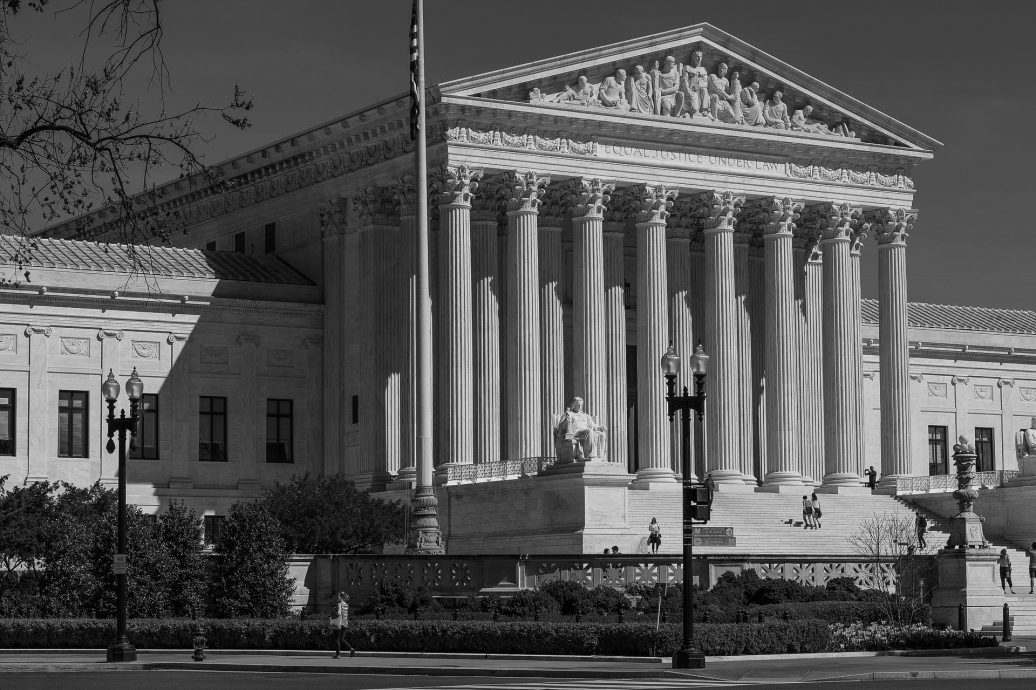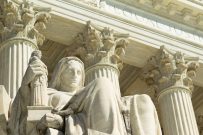A badly-flawed precedent is about to get KO’d in a rematch of a contest that last ended in a draw.
Ending Unions’ First Amendment “Attack and Retreat”
Attack, retreat. Attack, retreat. Unfortunately, this is the tactical offensive increasingly used by the country’s biggest public-sector unions to keep dues money flowing. They “attack” by imposing unconstitutional, restrictive policies on public employees but “retreat” whenever they are challenged in court. Historically, it has allowed union officials to avoid important court rulings that would otherwise allow public employees to choose whether to become or remain union members.
But the Supreme Court may put an end to it this term.
Judge Not, Lest Ye Establish a Legal Precedent
The Court will hear a free speech case, Uzuegbunam v. Preczewski, that could have profound implications for public-sector union members who want to resign their union membership but keep their jobs. On its face, the case has nothing to do with public-sector unions. But Uzuegbunam has turned into a case about an important justiciability issue called “mootness”—and about the courts’ willingness to protect constitutional rights.
Uzuegbunam involves two college students who distributed religious literature outside their college campus’s “free speech zones”—predefined areas on the campus that are supposed to be places students can protest or give speeches.
Unfortunately, free speech zones are often the subject of controversy and litigation because they almost always have the effect of restricting—not protecting—free speech. In this particular case, Georgia Gwinnett College seems to have had two major problems with its policies on free speech zones. First, they were perilously small and unavailable to students who wished to use them: the two free speech zones comprised just 0.0015 percent of the campus and were open about 10 percent of the week.
Second, their free speech zones did not actually allow for much free speech. The college had a policy under which speech could not “disturb the peace and/or comfort of person(s),” even in these supposedly “free speech” areas.
In 2016, campus officials stopped Chike Uzuegbunam—one of the students in this case—from distributing religious literature on campus outside the free speech zones. He was told that he had to reserve time within a free speech zone to speak about religious matters, which he did.
But campus officials again stopped Chike, this time presumably because someone complained that Chike’s speech made them uncomfortable. The school threatened punishment—including expulsion—if Chike kept speaking. Later that year, he filed a civil rights lawsuit to have the policies overturned.
Campus officials—who likely knew their policies were unconstitutional from the beginning—retreated. They quickly changed their policies and asked the court to dismiss Chike’s case so that no future precedent would be set. And it worked; the trial court ultimately held that the college’s policy change “mooted” Chike’s case and refused to issue a ruling on the merits of Chike’s complaint.
It would not be overly cynical to suspect that these college officials intended to unconstitutionally restrict speech on campus. In creating their unconstitutional policies, the college surely considered the possibility of litigation, ultimately wagering that students were unlikely to push back, get legal counsel, or go through with a lawsuit over it. And if students did end up marshalling the resources to fight back, the college could always reverse course and change the policy. Even this small Georgia college knew how to exploit the “mootness” doctrine in order to get a case dismissed.
Chike’s case is not just about campus free speech zones. Instead, it will protect students, government workers, and every citizen alike from “attack, retreat” erosions of their First Amendment rights.
The problem is that a change in policy like this is not a permanent reversal. It’s part of a tactical offensive: because there is no court ruling or injunction, campus officials may return to similarly egregious policies in one form or another once the case is over.
Fortunately, all that might change with Uzuegbunam. The Supreme Court should take this opportunity to rule that “attack, retreat” strategies—what this college did to Chike—should not deter the court from ruling, particularly when it comes to First Amendment rights.
And that is where public-sector employees could also win big.
Unions’ Mootness Abuse
Since 2018—when the Supreme Court held in Janus v. AFSCME that the First Amendment protects public employees from having to pay a union just to keep their jobs—union officials have increased their reliance on “attack, retreat” strategies just like the one at issue in Unzuegbunam to keep members from leaving the union.
The biggest public-sector unions now have policies that, for example, require members to pay dues “regardless of their membership status” and to collect those dues directly out of their paychecks for nearly a year afterward even though they have resigned. Yes, even if members resign from their union, the union will collect dues through wage garnishment.
When a union member attempts to resign, union officials cite these unconstitutional policies, then dare the member to take legal action.
Of course, sometimes public employees do just that, with the help of the National Right to Work Legal Defense Foundation or the Fairness Center. But once the case gets underway, the union invariably retreats to prevent a precedential decision. The union quickly reverses its policy—many times only for the member who took them to court—and then complain that the judge cannot rule on a “moot” case. Many judges have agreed, allowing the union to continue enforcing its policies against the other members.
For example, the United Food and Commercial Workers (“UFCW”) union told John Kabler (full disclosure: I served as an attorney for John) that he would have to join and pay dues to the union in order to work for the state. That was completely untrue, but John did not know that.
Because he needed the job, John had to pay a $200 initiation fee and monthly dues to a highly political organization with which he fundamentally disagreed. He signed a membership card—in triplicate, yet with no copies for him to take home—authorizing dues deductions from his paycheck. The authorization included this jumbled, 89-word sentence restricting his ability to leave the union:
I further direct that this [dues deduction] authority is to become effective immediately, and after the present contract expiration date shall remain irrevocable for a period of one (1) year therefrom or to the expiration of said contract, whichever occurs sooner, and shall continue in full force and effect thereafter unless I give written notice to the [employer] and the union by certified mail of my desire to terminate said authority at least thirty (30) days and not more than forty-five (45) days before any periodic renewal date of this authority.
One year later—once John discovered that he did not have to join UFCW in the first place—he sent a letter to the union and the state resigning his union membership. The union and state officials told him he could not leave until the following year.
John filed a lawsuit with the help of the Fairness Center, and his complicated litigation unfolded over the ensuing months. Eventually, UFCW changed its policy and let him out of the union. And when a magistrate judge finally issued a recommendation that spelled certain doom for UFCW, they gave John his money back too.
In the end—that is, after UFCW had successfully forced thousands of state employees to fund the union’s political operation—the court called the whole thing moot.
The change in policy was undoubtedly good in some ways for John and others, but UFCW made the change in order to avoid a binding, permanent ruling that would better protect state workers’ constitutional rights. And they could certainly revert to their policies in the future. In fact, even during litigation, the local union president bragged to one reporter that he had other ways of preventing employees from resigning their union membership.
The “mootness” principle is clearly being abused.
As former Chief Justice William Rehnquist once pointed out, the court-imposed mootness restriction “may be overridden where there are strong reasons to override it.” If the Supreme Court decides rightly in Uzuegbunam, mootness will no longer serve as a shield for constitutional violations like these.
Chike’s case is not just about campus free speech zones. Instead, it will protect students, government workers, and every citizen alike from “attack, retreat” erosions of their First Amendment rights. The Supreme Court’s acceptance of the case suggests that a majority has something new to say about the matter.

